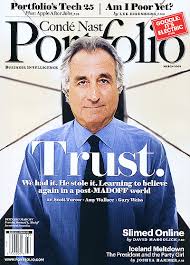What constitutes success? It seems like a relatively simple question but it is actually very hard to define success because what appears like a success at one moment in time can end up as an abject failure at a later point in time. The converse is also true. This represents a truism in basically all realms of human endeavors.
Take for example the world of financial investment management. Bernie Madoff was one of the most

successful money managers of the late 20th century. Even before he was infamous he was famous for his remarkable returns on investments and by all measures was a remarkable success attracting celebrity clients, assuming leadership positions in his industry, and being a darling of the philanthropy community. He was almost universally viewed as a success until he was not. He turned out to be a fraud and a failure because his formula for success was not sustainable. World history has been littered with similar individuals. Just today the WSJ reported on Eike Batista, a Brazilian tycoon whose empire is not collapsing. He was on the Forbes list of most wealthy people in the world as recently as last year. Now he is the center of perhaps the largest bankruptcy ever to occur in Brazil with the prospects of sending destabilizing financial ripples throughout the country and world. The same principle can be applied to institutions, states, and programs.

When I am driving in my care, I make it a point to take the opportunity to listen to the spectrum of political chatter, listening to both MSNBC and Fox News (as well as NPR). I would argue that MSNBC and Fox news have more in common that they might think and they should each thank their lucky stars that both exist. Each serves to create content for the other. I am struck by the differences in what different ends of the political spectrum view as successes, acceptable failures, and looming catastrophe. Perhaps I am naive (I know that to be the case) but I wish to believe that each side is motivated by the desire to create a better world, but they have very different views on how to go about doing this. Furthermore, each side uses a different set of what amount to be surrogate measures to identify success or failure in a time frame where they can actually measure things. In each case the time frames used by these hedgehogs (always certain and frequently wrong) are likely not entirely useful for avoiding what I refer to as the Bernie Madoff problem;
embracing early what end up being transient and non-sustainable approaches to solve real problems.

The theme is recurrent; create some program replete with subsidies or tax breaks, spur the development of rapid investment in some particular target area or create or support politically connected entities which are uniquely enriched by politically derived resource flows. The picture may look great, particularly for the select few who derive direct benefits, but what about the broader public? The picture tends to be even more muddled that a simple model of short term success vs. long term failure might imply. What we face is more like a muddled picture in all time frames with bad outcomes always mixed with some good outcomes which are not uniformly distributed. The politically connected will always fight much harder to protect their specific subsidies and rents because they directly benefit. This always happens when the benefits are concentrated and the costs are socialized and not easily measured.

Each side of the political spectrum cherry picks the respective outcomes to justify whatever they are advocating at the moment, creating implausible causality linkages which conveniently justify their talking points. The latest case is using the government shutdown and making the claim that this resulted in the poor job numbers just released. This is despite the fact the numbers were actually collected before the shutdown. While this particular case highlights a dubious claim of the political left, they have no monopoly on such claims. Reading David Stockman's books made me understand that success in politics going back to at least Nixon has required that one sell such dubious linkages to the public and deploy short term approaches to create transient success at the risk of creating long term failures. It likely goes back much farther (perhaps to the dawn of human civilization). I cannot help but think about Louis XV and his famous utterance about "After me the deluge". Success for him only mattered up until when he was dead.
Sustainability is one of those things which has been seized upon by various parties across the political spectrum. Here again the focus of sustainability anxiety differs across the various political parties. The right worries most about financial sustainability, focusing on deficit spending and the effects upon future financial growth and stability. The left focuses more on environmental issues and sustainability. In each case there are concerns that current practices are not sustainable and if continued they will lead to catastrophes. Who is right? How likely are these various scenarios to come about and in what time frames?

I must admit I worry more about financial calamities. They have happened with consistent regularity with spectacular financial and social breakdowns punctuating human history. Poverty and social chaos appear to be the default mode for the world. There are many more paths leading there than there are leading to wealth and order. In my limited experience the worst environmental degradation seems to happen where people are the poorest and the path to better environments seems to be through improved generation of wealth. The counter arguments focus on the possibility of existential environmental calamity driven by human action. If this is a "likely" possibility, it should change human behavior. However, we cannot come to an agreement as to what likely means and what threshold should inspire action. Good luck in driving a consensus. The problem is those most passionate about particular concerns function as advocates who have huge blindsides. There appears to be no ability to question their own beliefs and not vilify those with contrary opinions.
It leads us back to asking what is the success that we should aspire to and what cautions should be deploy on our way to those successes? It seems that all of us carry our own unique fears regarding what terrible events might unfold in our futures and we come to these conclusions using primarily emotional decision making tools. Based upon the work of Jonathan Haidt, it seems that these belief systems may be hard wired to some degree. The ends of the political spectrum hold certain things in common, most notably their certainty of being right and having short memories of when they were wrong.